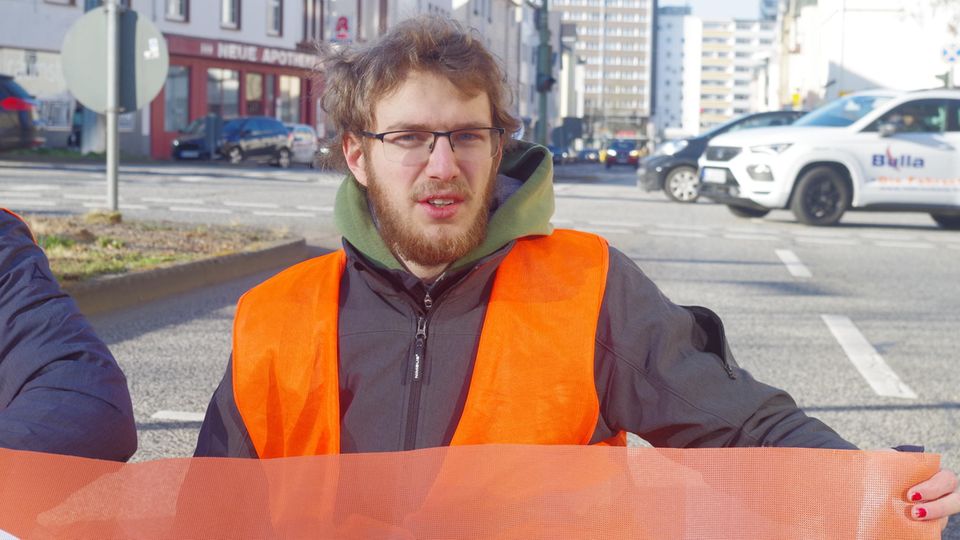climate activist
Police officer and the “Last Generation”? “It works for me,” says Chiara Malz from Rostock
Although Chiara Malz is a member of the “Last Generation”, she does not take part in road blockades
© Jens Büttner / DPA
“Last generation” and police? The first thing that comes to mind is officials who carry away climate activists. Chiara Malz shows that the relationship is more complex. She is both: a police officer and with the “last generation”.
Climate activists of the “last generation” sometimes have to be tough. police officers too. Chiara Malz is both. “It’s very demanding,” says the 32-year-old about the attention she gets. She is the chief police inspector at the Federal Police Inspectorate in Rostock. Actually, she doesn’t want to focus on that, says Malz of the German Press Agency. Nevertheless, it attracts attention.
“It works for me,” says Malz about the combination. She is committed and expresses herself privately. “And as a human being, I have exactly the same basic rights in Germany like everyone else too.” Regarding the disciplinary proceedings that are now underway against her, she says: “I want to be open to criticism in case I didn’t behave properly.” According to her, it doesn’t turn that much their support for the “last generation” per se and more about the compatibility of their civil service duties with the content of their public appearances.
Malz speaks openly, almost optimistically, about her commitment. In her living room, which is decorated with countless souvenir photos, she talks about the climate catastrophe as an opportunity for community engagement. She sees the attention as an opportunity to start a conversation. “In fact, it’s more positive than what I thought I was getting into.”
Police officer Chiara Malz has received criticism and encouragement from within her own ranks
There is certainly criticism. “Nobody will stop you from submitting your resignation to the police,” said the deputy federal chairman of the German Police Union (DPolG), Heiko Teggatz, the “world”. “I’m sure there are also very, very many colleagues in the police who would like to support you.” According to Malz, others write that she is not worthy of wearing a uniform. Because the senders didn’t know anything about her or her commitment, she didn’t take it to heart.
“And then there are other colleagues who clearly express their solidarity with me.” Partly in handwritten letters, they were sometimes pleased “that there is someone else who is now basically taking on this burden”.
Malz would not take part in protests and would not stick to the street, she says. “That was never my role on ‘Last Generation’.” Instead, she works in the networking team that tries to make contacts in society. Her focus is on the police.
Among other things, the aim is to express the fears and concerns of police officers with regard to climate change – it is planned, for example, to hand over a letter to Federal Chancellor Olaf Scholz (SPD). Should the climate crisis and with it social tensions or the refugee situation worsen, Malz sees police officers as possible victims. They would then be at the center of these conflicts.
As long as “last generation” are allowed, membership is a private matter
Networking should also de-escalate and ensure mutual understanding. Police officers should also say where they have particular problems with operations related to climate action. According to Malz, eight police officers worked on the team. However, seven are currently active because the disciplinary proceedings against them have caused at least one colleague to be more cautious.
The exchange takes place at talks and events. In June, for example, Malz gave a lecture to colleagues at the German Police University (DHPol) in Münster. This had caused criticism from the FDP and CDU in North Rhine-Westphalia.
Markus Thiel, who teaches at the university, says that a lot of work is done on climate activists and the right to assembly. It is also important to hear the other side. “If that’s a police officer who has a perspective on all sides, then of course they’re interesting speakers.” According to his own statement, the academic has been dealing with police law for more than 20 years. As long as the “last generation” is not banned in any way, police officers are generally allowed to join it privately.
You cannot be held responsible for crimes committed by other members. After all, members of a shooting club would not be punished if a shooter ran amok. In the case of incitement or support, things are of course different. The duty of moderation and neutrality also belonged to the special service and loyalty of civil servants. Police officers, if they appear as such, should not “lean excessively out of the window” with political statements. Thiel refers to the debate surrounding the appearance of the speed skater and federal police officer Claudia Pechstein at the CDU in uniform.
But: There are certain limits for police officers
There are also certain limits for police officers in private life. However, he sees neither the duty of moderation nor duty of neutrality violated just by being a member of a climate protection movement. It would be different with statements against the free democratic basic order. Even if the movement were to oppose this order officially with the main goal, Malz would have to distance himself from the movement, according to Thiel.
By autumn at the latest, Malz’s priorities, whose boyfriend is also a police officer, are likely to change. She is currently banned from employment. Her baby bump is already clearly visible.


